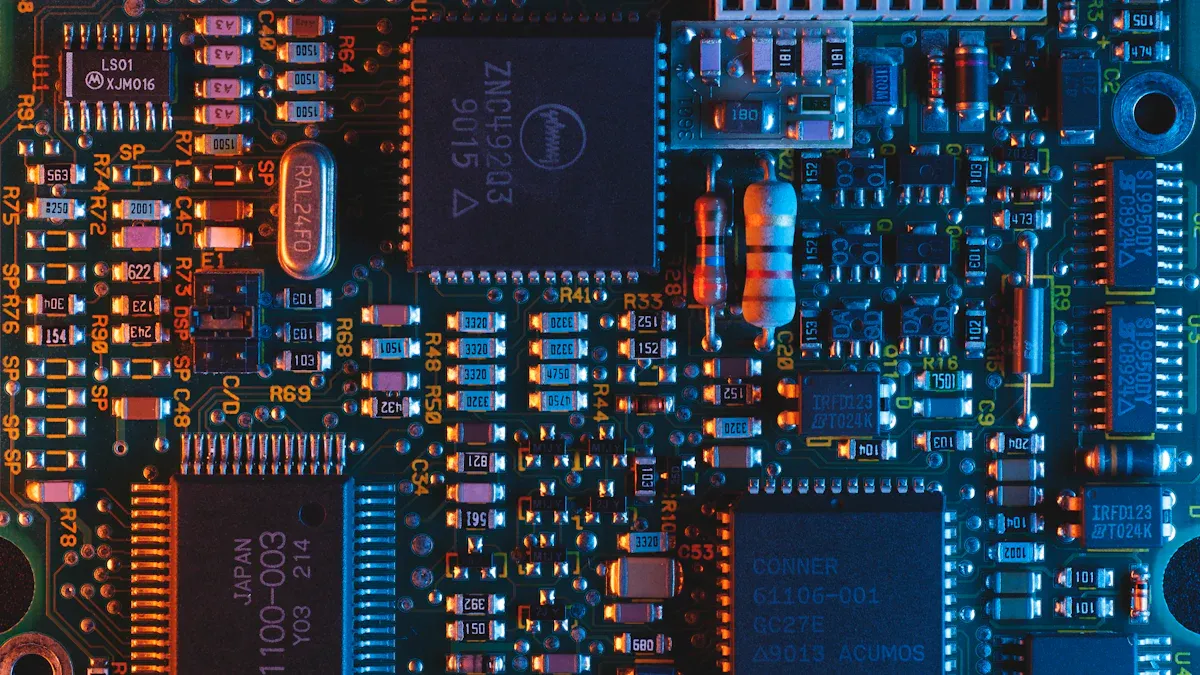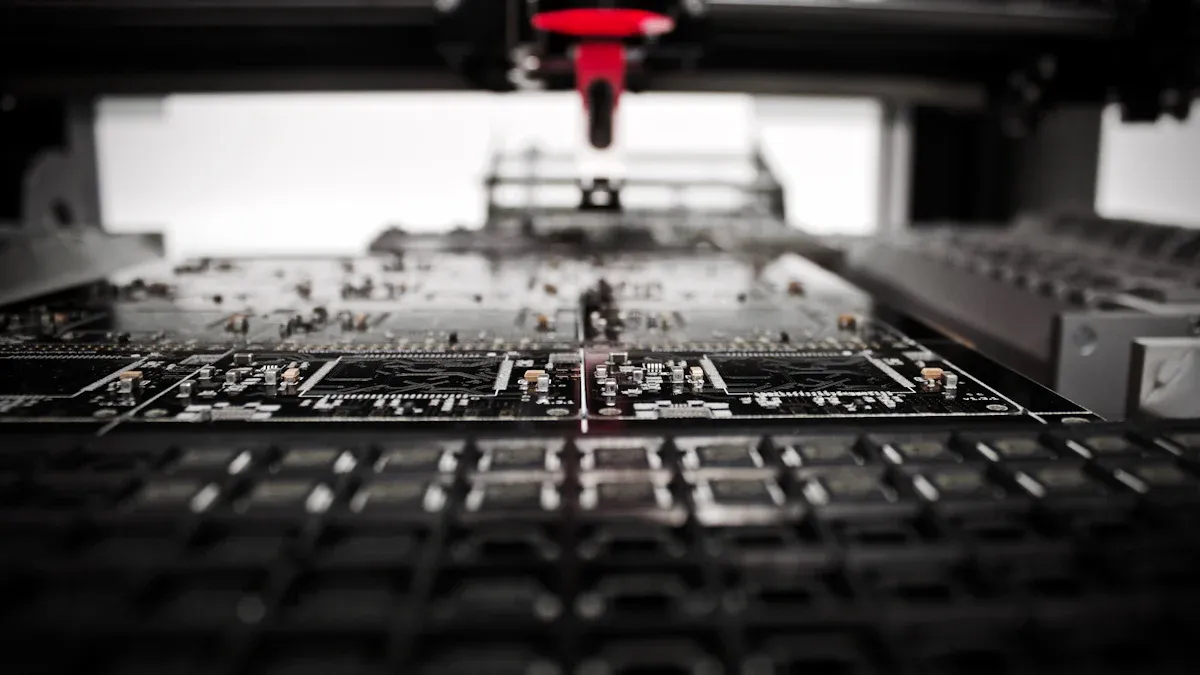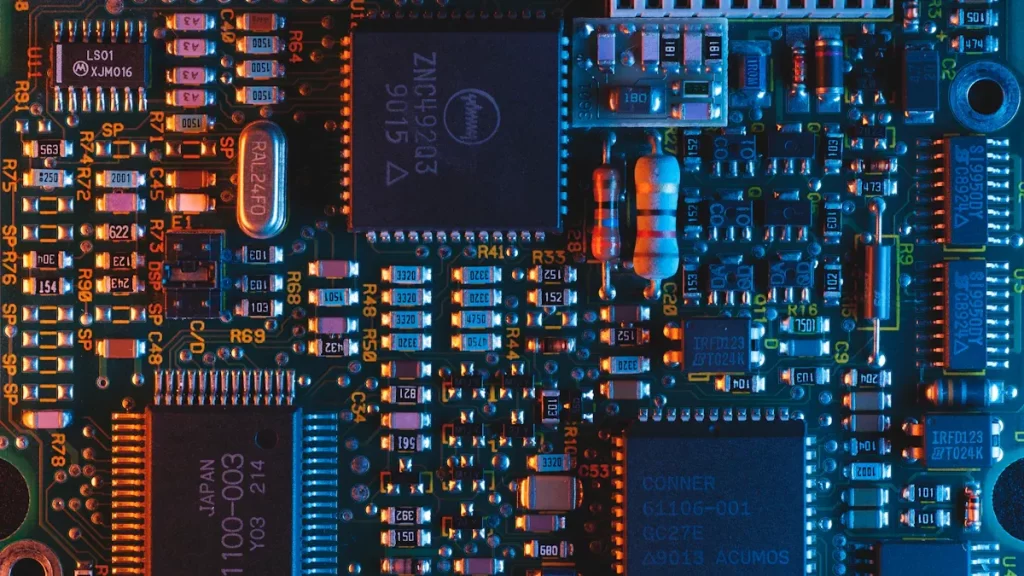
ITAR rules protect important technologies in fields like ITAR compliant PCBA manufacturing. These rules control the sharing of defense-related products and services, helping to keep sensitive information safe from the wrong people. For example, the United States Munitions List (USML) lists items important for military or intelligence work. Sharing these items without permission could harm national safety.
In 2025, ITAR compliant PCBA manufacturing helps protect advanced technologies. It ensures that PCBs for defense adhere to strict regulations. By following ITAR, you contribute to national security and gain access to defense markets.
Key Takeaways
ITAR rules are important for PCBA makers to keep defense tech safe and protect the country.
Sign up with the Directorate of Defense Trade Controls (DDTC) to work with defense items legally and avoid fines.
Use strong data safety tools, like encryption and access limits, to protect important info.
Train workers often on ITAR rules to stop mistakes and follow the law.
Following ITAR rules can make your company look good and help you get big defense jobs.
What is ITAR Compliance in PCBA Manufacturing?

What ITAR Means and Why It Matters
ITAR stands for International Traffic in Arms Regulations. These are rules managed by the U.S. Department of State. They come from the Arms Export Control Act of 1976. ITAR controls the export of defense items, services, and data. It keeps sensitive information safe and protects national security.
For PCBA manufacturing, ITAR rules ensure secure handling of defense data. This includes keeping technical data safe from unauthorized access. Only certified companies can export defense-related technology. Following ITAR is not optional; it is required by law.
How ITAR Affects PCBA Manufacturing
ITAR is very important in making PCBs for defense use. It controls how PCBs and related data are made and shared. This includes electronics and technical data for military use. For example, if a PCB design has defense-related data, ITAR ensures it stays secure.
ITAR compliance is more than just following rules. It helps protect technologies that keep the country safe. By following ITAR, you help secure the defense supply chain. This prevents critical technologies from falling into the wrong hands. In 2025, this is even more important due to new global threats.
Examples of ITAR Items in PCBA Manufacturing
ITAR covers many defense-related items in PCBA manufacturing. Here are some examples:
Military communication devices.
Aerospace parts like satellite components.
Electronics for launch vehicles.
Explosives and their electronic triggers.
Aircraft navigation and control systems.
Protective gear with electronics.
Fire control and targeting systems.
Military electronics like radar systems.
Aspect | Details |
|---|---|
What ITAR Is | Rules from the Arms Export Control Act of 1976. |
Why It Exists | To control and protect defense-related items and data. |
PCBA Manufacturing Impact | Defense-related PCB data must follow ITAR rules. |
Who Must Follow ITAR | Everyone in the supply chain must obey these laws. |
These examples show how ITAR affects PCBA manufacturing. Manufacturers must follow ITAR rules to avoid penalties. This also helps them stay trusted in the industry.
Key Requirements for ITAR Compliance
Registering with the Directorate of Defense Trade Controls (DDTC)
To follow ITAR rules, you must register with the DDTC. This is required for companies making, exporting, or handling defense items. Registration shows your company is part of the defense supply chain. It also proves you follow ITAR rules.
You need to understand ITAR rules too. Learn how they apply to your products or services. This is especially important if your work involves items on the USML list. Without registration, your company could face big fines or lose export rights.
Requirement | Description |
|---|---|
Registering with DDTC | Companies must register if they make, export, or handle defense items. |
Knowing ITAR rules | Businesses must know how ITAR applies to their work. |
Protecting Data and Using Encryption
Keeping technical data safe is key to ITAR compliance. You need strong security to stop unauthorized access. This includes locked facilities and cybersecurity tools like firewalls and encryption.
A secure digital system is very important. Use encrypted networks and limit access to protect data. For example, companies use secure file transfer tools like SFTP to share sensitive files. These steps meet ITAR standards and keep your company compliant.
Important cybersecurity tools include:
Firewalls to block threats.
Encrypted systems for safe communication.
Clear cybersecurity rules for employees.
Secure file transfers help protect designs and reduce data leaks.
Limiting Access to Sensitive Data
ITAR rules require strict control over sensitive data. Only approved people should see, edit, or share important files. This lowers the chance of unauthorized access and keeps data safe.
Keeping records is also important for ITAR compliance. Logs should show who accessed or used data and when. For example, track file and system access to prove you follow ITAR rules during audits.
Compliance Step | Description |
|---|---|
Strict access controls | Only approved people can handle sensitive information. |
Keeping detailed logs | Tracks data use and access for audits and compliance. |
By following these ITAR rules, you can protect data, avoid fines, and stay trusted in the defense industry.
Employee training and awareness programs
Training workers is key to following ITAR rules. Your team must know the rules and how to protect sensitive data. Without training, workers might break ITAR rules by mistake. This could cause big problems for your business.
Create a clear training plan for your team. Teach them about ITAR basics, like spotting controlled items and keeping data safe. Use real-life examples to make lessons simple. For example, show how mishandling a military PCB design could break ITAR rules.
Update training materials often to match new ITAR changes. This keeps workers aware of the latest rules. Offer refresher courses to help them remember important details. Fun activities like quizzes or role-play can make learning easier.
Build a workplace where everyone cares about ITAR compliance. Let workers know they all share the responsibility. Give clear steps for reporting problems or security risks. This helps prevent rule-breaking and protects your company from data leaks.
Spending time on training helps meet ITAR rules. It also creates a smart team that handles sensitive tech safely. This boosts your company’s trust and reputation.
Benefits of ITAR-Compliant PCBA Manufacturing

Following the Law and Avoiding Fines
Sticking to ITAR rules keeps your company within legal limits. These rules control how defense technology is shared or exported. Breaking them can lead to big fines or losing export rights. By following ITAR, you avoid these problems and stay part of the defense supply chain.
Making ITAR-compliant PCBs shows you care about national safety. It proves you handle sensitive data responsibly. This protects your business and builds trust as a dependable partner in defense work.
Better Data Safety and Protection
ITAR rules mean you must keep technical data very secure. Use strong passwords, encryption, and safe storage systems. These steps stop hackers or unauthorized people from accessing your data.
Focusing on data safety lowers the chance of security problems. It also shows clients and partners that their information is safe with you. Good cybersecurity helps you stay trusted in the defense industry.
Boosted Business Trust and Reputation
ITAR compliance makes your company more trustworthy in defense work. Certifications and audits prove you follow strict quality and safety rules. These show clients and partners that your work meets top standards.
Key Point | Description |
|---|---|
Why Certifications Matter | Proves you follow quality and safety rules, building trust. |
ISO Certifications | Shows you use the best practices for managing quality and security. |
Defense-Specific Approvals | Includes clearances and certifications for defense-related work. |
Third-party Audits | Confirms your processes are reliable and secure. |
By following ITAR, your company becomes a trusted name in defense. This trust can lead to new contracts with government and defense groups. It also helps you stand out from competitors who don’t meet these high standards.
Access to defense-related contracts and markets
Following ITAR rules helps you work on defense projects. It shows your company can handle sensitive technology safely. This makes you a trusted choice for government and defense groups.
Defense contracts often pay very well. Governments prefer ITAR-compliant companies to protect national security. When you follow these rules, you can bid on big projects. Winning these contracts can bring steady income and long-term partnerships.
Tip: Mention your ITAR compliance in ads to attract defense clients. Certifications can make you stand out from others.
Being ITAR-compliant also improves your company’s reputation. It shows your work meets top security and quality standards. This trust can help you grow into other industries like aerospace or advanced tech.
Benefit | Description |
|---|---|
Eligibility for contracts | Lets you bid on defense projects and win big deals. |
Enhanced reputation | Builds trust with defense clients and other industries. |
Market expansion opportunities | Helps you enter fields like aerospace and advanced technology. |
By following ITAR, you protect data and grow your business. Defense markets are tough, but ITAR compliance gives you an advantage. It proves you can meet the needs of this special industry.
Note: Breaking ITAR rules can block you from defense contracts. Always follow the rules to stay successful.
Risks and Consequences of Not Following ITAR
Big Fines and Legal Trouble
Not following ITAR rules can cost a lot of money. Breaking these rules can lead to huge fines or even jail time. For example, in September 2024, the U.S. took a Dassault Falcon 900EX plane because of ITAR violations. This shows how serious the risks are. Also, five cases of export rule-breaking led to criminal charges, showing the government’s strict approach.
Date | Event |
|---|---|
September 2, 2024 | A Dassault Falcon 900EX plane was taken for breaking ITAR rules. |
September 16, 2024 | Five cases of export rule-breaking led to criminal charges. |
Breaking ITAR rules can mean fines up to $1 million per violation. If done on purpose, it could also mean jail time. Civil fines can go up to $1.09 million for each violation. These fines can add up to tens of millions. Losing your export license, called debarment, can shut down your business and cancel contracts.
Penalty Type | Details |
|---|---|
Criminal Fines | Up to $1 million and 10 years in jail for intentional violations. |
Civil Fines | Up to $1.09 million per violation, adding up to millions. |
Debarment | Losing export rights, which can close your business and cancel deals. |
Losing Business Deals
Not following ITAR rules can block you from defense contracts. Governments only work with companies that follow ITAR to keep the country safe. Losing your export license means you can’t bid on defense projects. This could shut your company out of this important market.
Defense contracts bring steady money and long-term deals. Without ITAR compliance, your company could lose its edge. You might miss chances to grow in defense and aerospace industries.
Hurting Your Reputation
Breaking ITAR rules can damage your company’s name. Clients, partners, and regulators may lose trust in you. Public attention on rule-breaking can harm your credibility. This could make you lose current deals and scare away new clients.
Breaking ITAR rules can hurt your reputation and relationships.
Fixing your reputation after breaking ITAR rules is hard. Clients may doubt your ability to keep data safe. This can slow your company’s growth and make it less stable.
Losing the Right to Export
Breaking ITAR rules can lead to losing export rights. This punishment can hurt your business, especially if you export defense products.
If you break ITAR rules often or in a big way, the U.S. government might decide you can’t handle sensitive technology anymore. Without export rights, you can’t ship defense items or share technical data with other countries. This can cause canceled deals, lost money, and a damaged reputation.
Losing export rights is more than a small problem. It can stop your supply chain and pause important projects. For instance, if you make PCBs for military or space use, losing export rights means you can’t deliver parts to clients. This delay can upset partners and customers who need your products on time.
To prevent this, focus on following ITAR rules. Check your processes often to ensure they meet the rules. Keep good records of exports and protect sensitive data. These steps lower the chance of breaking the rules and show you take compliance seriously.
Tip: Work with ITAR-compliant suppliers to stay on track. Their knowledge can help you meet the rules.
Losing export rights is a big deal. By staying proactive, you can protect your business and keep helping the defense industry.
How to Achieve and Maintain ITAR Compliance
Conducting Regular Compliance Audits
Regular checks are key to meeting ITAR rules. These checks find problems early and fix them fast. By reviewing your processes, you can avoid big mistakes and fines.
To do audits well, follow these steps:
Plan regular checks: Set a schedule for audits.
Write down results: Keep records to show progress and compliance.
Hire experts: Outside help gives a fair review of your efforts.
Watch shipments: Make sure all exports follow ITAR rules.
Tip: Use software to make audits easier and keep records updated.
Audits show clients and partners you care about safety. A clear audit trail proves you protect sensitive technology, which is vital in defense work.
Using Strong Data Encryption and Cybersecurity
Keeping data safe is a big part of ITAR compliance. Cyber threats change often, so strong security is a must. Encryption and other tools stop unauthorized access to important information.
Here’s how to secure your data:
Encrypt files: Protect sensitive data from being stolen.
Use firewalls: Block bad traffic and keep networks safe.
Share data safely: Use secure tools like SFTP for file sharing.
Update systems: Fix security issues by keeping software current.
Cybersecurity Tool | How It Helps |
|---|---|
Encryption | Stops others from seeing private data. |
Firewalls | Blocks harmful traffic from entering your network. |
Secure File Transfers | Keeps shared files safe from hackers. |
Software Updates | Fixes weak spots in systems and boosts security. |
Note: New tech like AI and blockchain can improve cybersecurity. These tools help manage risks and meet ITAR rules.
Focusing on security protects your company’s name. Clients will trust you to keep their data safe.
Setting Clear Access Control Rules
Access rules are crucial for ITAR compliance. They ensure only approved people handle sensitive data. Limiting access lowers the chance of mistakes or breaches.
Follow these steps to create good access rules:
Set roles: Give access based on job needs.
Use multi-factor login: Add extra steps to confirm user identity.
Track access: Record who uses data and when.
Review often: Check permissions regularly to keep them accurate.
Callout: Many ITAR issues happen due to unauthorized access. Clear rules and tracking can prevent this.
For example, if you make defense PCBs, only trained staff should handle designs. Letting unapproved people access them could lead to fines or losing export rights.
Strong access rules protect data and show you follow ITAR. This helps you stay competitive in defense work.
Providing ongoing employee training and certification
Training your workers is key to following ITAR rules. They need to know the rules and how these apply to their jobs. Without training, workers might break ITAR rules by mistake, causing big problems for your business.
Create a training plan that fits your company’s needs. Focus on important topics like spotting ITAR-controlled items, keeping data safe, and knowing export limits. Use real-life examples to make lessons clear. For example, show how mishandling a military PCB design could break ITAR rules.
Update training materials often to match new ITAR changes. This keeps workers aware of the latest rules. Offer refresher courses to help them remember key points. Fun activities like quizzes or role-play can make learning easier and more interesting.
Certifications can also help. Certifying workers shows they are ready to handle ITAR tasks. This improves your company’s trustworthiness and lowers the chance of breaking rules.
Build a workplace where everyone cares about ITAR compliance. Let workers know they all share the responsibility. Give clear steps for reporting problems or risks. This helps stop issues before they grow.
Tip: Hold regular training sessions to keep ITAR rules fresh in workers’ minds. A well-trained team is both careful and informed.
Partnering with ITAR-compliant suppliers and vendors
Working with ITAR-compliant suppliers makes your compliance stronger. These partnerships ensure your supply chain follows ITAR rules, lowering the risk of mistakes.
When choosing suppliers, check if they follow ITAR rules. Look for proof like certifications or documents showing they handle ITAR-controlled items safely. For example, a supplier making defense PCBs should show strong data security and safe processes.
Stay in touch with your suppliers. Share your compliance needs and ask for updates on their ITAR practices. Clear communication builds trust and keeps everyone on the same page.
Check your suppliers regularly to see if they follow ITAR rules. These checks can find risks and fix problems early. For instance, review how a supplier protects sensitive data or trains their workers.
Using ITAR-compliant vendors can also bring new chances. Defense contracts often need a fully compliant supply chain. By working with vendors who meet ITAR rules, your company becomes a trusted choice for defense projects.
Note: Strong ties with ITAR-compliant suppliers not only ensure compliance but also boost your reputation in defense work.
ITAR rules are important for keeping sensitive tech safe in PCBA work. Following these rules helps protect the country and makes your business a trusted defense partner. Taking steps like regular checks and strong cybersecurity keeps things running smoothly and lowers risks.
Evidence Type | Description |
|---|---|
Quality systems have steps to find and fix errors early. | |
Digital Processes | Using digital systems ensures updated steps, reducing mistakes. |
High Quality Standards | Reaching 5 sigma quality shows strong focus on following rules. |
Worker Tracking | Watching worker actions ensures responsibility and rule-following. |
Tech Upgrades | Buying new tools yearly keeps processes up-to-date with standards. |
To follow ITAR rules in 2025 and later, take these steps:
Work with companies that follow ITAR rules for design and manufacturing.
Sign up with the DDTC and learn its rules.
Register in SAM and get a CAGE code before signing up with DDTC.
By focusing on ITAR rules, you help your business grow in the defense industry.
FAQ
1. What does ITAR compliance mean for PCBA manufacturers?
ITAR compliance means following strict rules to protect defense items. It keeps sensitive technologies safe and blocks unauthorized access. For PCBA makers, this means securing designs, processes, and military-related exports.
2. How can you check if your company needs ITAR compliance?
Compare your products to the United States Munitions List (USML). If you work with defense items or data, you must comply. Register with the Directorate of Defense Trade Controls (DDTC) to confirm this.
3. What happens if you fail to comply with ITAR regulations?
Breaking ITAR rules can lead to big penalties. You might face fines up to $1 million per violation. You could lose export rights or harm your reputation. Intentional violations may even lead to jail time.
4. Do all employees need ITAR training?
Yes, workers handling sensitive data or defense items need training. This helps them understand the rules and avoid mistakes. Training ensures they follow proper steps to prevent violations.
5. Can ITAR compliance help you win defense contracts?
Yes! ITAR compliance shows you can handle sensitive technologies safely. This builds trust with defense clients and government groups. It can help you get big contracts and long-term deals.
See Also
Future Trends in X-ray Inspection for PCBA Quality Control
Comparing Turnkey and Consignment Manufacturing for PCBA in 2025
Discover AI’s Role in Advancing PCBA for Electronics
Achieving High-Quality PCBA Through Mastering Manufacturing Techniques
Speeding Up PCBA Production While Maintaining Quality Standards





